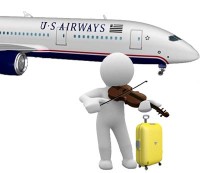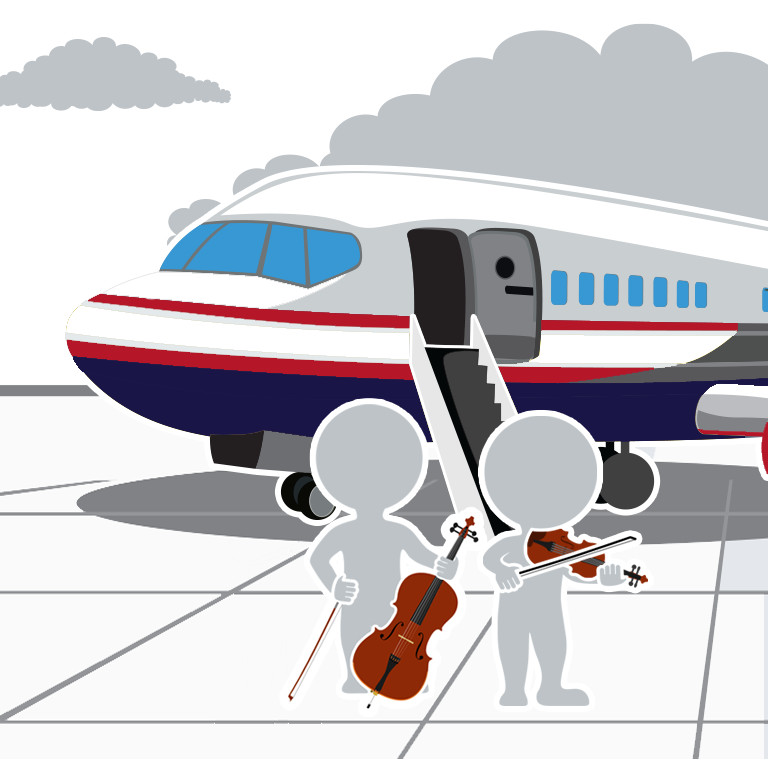The internet was alive with outrage since the trio Time for Three posted a video on YouTube protesting their treatment at the hands of a US Airlines regional carrier. Apparently, two of the three members were traveling from Charlotte, NC to Fayetteville, AK when the aircraft’s captain allegedly told the two violinists that FAA regulations “prohibited musical instruments to be carried on the plane.” As it turns out, that’s just about as far from accurate as possible (it will be interesting to see how US Air deals with this) but there are still a few catches musicians and their employers should be aware of.
 The FAA Modernization And Reform Act Of 2012 (pdf) stipulates that air carriers can not universally prohibit passengers from carrying small instruments as carry-on baggage. At the same time, the small instrument statement contains an “if” provision worth noting.
The FAA Modernization And Reform Act Of 2012 (pdf) stipulates that air carriers can not universally prohibit passengers from carrying small instruments as carry-on baggage. At the same time, the small instrument statement contains an “if” provision worth noting.
Sec. 403. Musical Instruments
a) In General – Subchapter I of chapter 417 is amended by adding at the end the following:
§41724. Musical instruments
(a) In General
(1) SMALL INSTRUMENTS AS CARRY-ON BAGGAGE. – An air carrier providing air transportation shall permit a passenger to carry a violin, guitar, or other musical instrument in their aircraft cabin, without charging the passenger a fee in addition to any standard fee that carrier may require for comparable carry-on baggage, if-
(A) the instrument can be stowed safely in a suitable baggage compartment in the aircraft cabin or under a passenger seat, in accordance with the requirements for carriage of carry-on baggage or cargo established by the Administrator; and
(B) there is space for such stowage at the time the passenger boards the aircraft.
In Time for Three’s case, it appears that the “if” conditions were not present in their situation but having said that, the “if” provisions should be quite clear: if the overhead is full or your case doesn’t fit, you are SOL.
Consequently, the smart move for musicians and their employers here is to maximize the favorable change in regulations by ensuring early boarding via purchasing early boarding upgrades (which many airlines now sell as a way to nickel-and-dime passengers) or acquire elevated passenger status, the latter of which can be accomplished by accruing a certain level of travel miles over a given period of time or by purchasing the membership, either directly from the airline or via a related credit card program.
This should help prevent any anxiety over item a.1.B. but there’s not much else that can be done about a.1.A. if airlines decide to continue reducing the size of overhead compartments or completely remove them.
But wait, there’s more…
It will be fascinating to see how much confusion and frustration ensue if most major air carriers follow the lead of Frontier and begin charging a standard fee to place a bag in the overhead bin.
Granted, I don’t envy any airline employee tasked with enforcing and verifying that gem of a rule, nonetheless, the potential for conflict among airline employees and musicians with small instruments is even higher in those instances, especially when something like Frontier’s revenue generating policy intersects with Sec. 403.
For the time being, it appears that so long as airlines charge all passengers a fee to use the overhead bins, musicians with small instruments won’t be able to use Sec. 403 to avoid paying it.
In the meantime, you can check out Time for Three’s protest video via tri member Nicolas Kendall’s YouTube account.
*A No-Goodnik Fiddle Ruffian is recognizable by the propensity to perform unaccompanied works by the masters in hazardous spaces as an act of defiance while adorned in popular urban fashions such as hoodies, athletic sportswear (albeit dubious intent for engaging in said athletic activity) and backward base ball caps while simultaneously maintaining a high hair-to-product ratio and waggish facial hair.



I’ve flown with my trombone for many years now (in a soft case even), and I’ve never had any problems.
Know why? I’m incredibly kind, patient and understanding with each and every employee. It also helps that I try to get on the airplane as early as humanly possible. If my instrument gets tagged at the gate, I just take off the tag before boarding the plane. If you explain your situation and your fear you will find empathetic employees. Don’t ruffle feathers. It’s bad practice. Airline employees have to deal with some of the worst tempers I have ever seen.
Just my .02,
William
Dear William Paceley,
I take it most of your travel with your trombone takes place in the U.S. and I’m happy for you that it’s going well. I do think you are being a bit smug and you have’nt realized how bad this problem can be, especially for string players. My wife and I travel all over the world with a viola. When we have these sorts of problems, which are increasingly frequent, we really try hard to be polite, patient, and explain in as measured and reasonable terms as possible why it’s not possible to put a very fine (or even less fine for that matter) instrument in the hold though I make no claim to reaching levels of kindness I would qualify as ‘incredible’. The biggest problem has been with VUELING, which is a Spanish low cost airline. They make you pay for an extra seat for instruments which are longer than 55 centimeters. If you pay when checking in it is way more expensive than the fare for a person for the same flight. No amount of niceness, patience and understanding however beyond belief it may be, will change that. Since we often fly on routes that are quasi monopolies of this unfortunate airline it is a real problem for us. Other airlines’ employees will occasionally attempt to prevent us taking the viola in the cabin but until now we have been able to reason with them or with a better trained superior employee–but not VUELING or RYANAIR. If ever these airlines start charging for carry on luggage, as is discussed in Mr. McManus’ blog, I hope this would have a paradoxically positive effect since now people try to cram their belongings into cabin luggage to avid paying for suitcases being placed in the hold. At the same time when all carryons would have to e payed for the airlines might be satisfied to get their pound of flesh and be less irrationally rigid about the length of a viola or violin case, considering that the actual volume of the latter is generally smaller than that of a cabin case, regardless of the length.
Charles Zebley
Charles,
Thanks for your reply. I was referencing my air travel in the U.S., as this article specifically cites FAA law (and the aforementioned incident is regarding U.S. air travel). I do not have experience traveling with my instrument outside of the United States.
Best,
William
Fair enough. But if you’ll pardon my continuing to grind my axe (as it were) …similar or identical laws do exist in Europe but VUELING and RYANAIR still refuse to comply…according to this article in the Telegraph regulations will be reinforced in 2015… : http://www.telegraph.co.uk/news/aviation/9662516/Musicians-have-won-a-major-victory-over-airlines.html.
Let this at least serve as an example of how important it is to protect and defend the right to travel with musical instruments in the face of greedy airlines.
Last time I was aware, the FAA had not written the regulations for this section of the new law, so it couldn’t go into effect. I think I heard in a news report that the February 2014 deadline passed, and the FAA claimed it didn’t have the funding to hire people to write the regs. Although FAA encouraged airlines to begin complying voluntarily before the law went into effect, airlines were not required.
Has anyone heard more about the regulations?
Section 403.A(3)(b) “REGULATIONS.—Not later than 2 years after the date of enactment of this section, the Secretary shall issue final regulations to carry out subsection (a).
(c) EFFECTIVE DATE.—The requirements of this section shall become effective on the date of issuance of the final regulations under subsection (b).’’
There is a petition asking US Secretary of Transportation to proceed with writing regulations for HR 658:
http://www.change.org/petitions/us-secretary-of-transportation-ray-lahood-stop-delaying-implement-musical-instrument-protections-passed-into-law
DOT replied that it had requested funding in the FY2014 federal budget to cover the rulemaking.